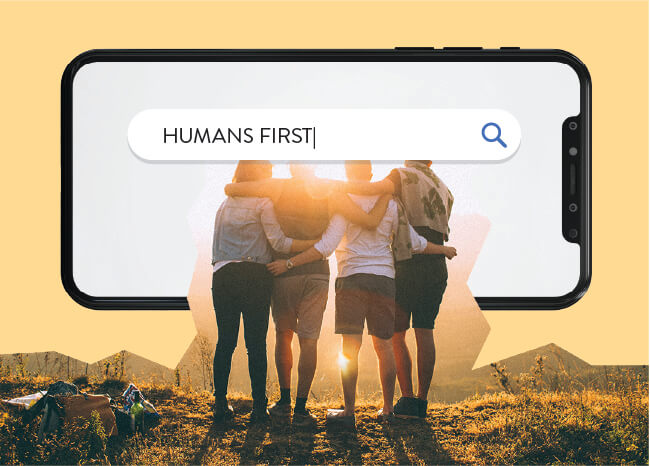
As an SEO professional, I have a complicated relationship with Google Search. I have two distinct identities — that of a searcher and that of an SEO professional — that influence the way I search and create SEO content.
Thinking like an SEO isn’t enough to rank successfully or sustainably. You’re prioritizing either your own deliverable goals or your clients’ goals for the project at hand. When you fixate on what you can get out of SEO, you’ll lose sight of the searchers your content is meant to serve. Focusing on your interests can alienate searchers and inhibit your ability to rank, ultimately defeating the purpose of doing SEO in the first place.
Thinking like a searcher, however, compels you to prioritize what search engines value most: human users. By keeping real-world searchers in mind, you’re setting your content up for success and getting the most value possible out of your SEO efforts.
Distinguishing Between the Searcher and the SEO
Despite the alleged flaws, as a searcher, I love Google and its search algorithm. It’s incredibly easy to use and, though it may take a few different searches, I can find information quickly. I’m usually looking for an answer to a question. Once I find my answer, I move on.
Things are different when I’m searching at work. I’m not just looking for the answer to a question (though that’s certainly part of it). I’m trying to figure out what it takes for a page to rank in a given keyword space. I want to know, in Google’s opinion, what a good answer to that question looks like.
I have an idea of how Google ranks search results, but the lack of transparency in the algorithm makes it infinitely more difficult to determine what makes a “good” answer. What’s more, the algorithm updates constantly. With a major update, Google’s definition of a good answer can change overnight.
I understand Google’s reasoning for keeping much of the algorithm under wraps, and I don’t want to know more about the algorithm to game the system. I want to know more about the algorithm so I can create high-quality content that provides real value to real people.
Understanding Google’s Priorities

After all, that is one point Google has made abundantly clear: they prioritize human users in search. With each new update, Google trends further in this direction, making search better, more accessible, and more reliable for their users. They care about how users feel about your content, not how you feel about that content or its ability to drive sales or conversions for your brand.
This means there is no way to do SEO (or at least, no way to do it well) without considering human searchers. If providing value to human users is Google Search’s raison d'être, then the same can be said of SEO.
Much like oxygen is a byproduct of photosynthesis, succeeding in search is a byproduct of serving searchers. SEO isn’t advertising, nor should it be. If you prioritize your interests at the expense of human users, you’ll struggle to rank, because, in Google’s eyes, you don’t deserve to.
Prioritizing Human Users in SEO Content
Prioritizing the end-user has become my guiding light for content creation; everything else is secondary and helps me accomplish that goal. With this approach, I can ensure my content is meaningful and authentic for users, while still being strategically valuable for clients.
My client’s niche allows me to identify who those users are, while their goals for a campaign determine the method I’ll use (either linkable or keyword-focused content) to reach them. No matter the avenue, keyword research tells me what subjects that audience cares about or what specific questions they have. Competitors in the SERPs inform how I go about providing that answer in my content.
Finally, I try to think like a searcher when executing this work to remind me what features are useful on a page, and what is off-putting, self-serving, or unnecessary.
Thinking Like a Searcher

No matter how embroiled you are in the world of SEO, you’re a searcher too. You can use that perspective to inform your work as an SEO.
Next time you search, pause for a moment and look at some of the top-performing pages. Notice what features, either positive or negative, stick out to you in both the main and supplementary content. What contributes to your experience on that page and what detracts from it? Is that page managing to rank because of those attributes, or despite its flaws?
Apply that same line of thought to your own pages. Think about how you would feel if you found your content at the top of a SERP. If that page wouldn’t answer your question or satisfy your intent, searchers will likely feel the same way. If you would leave that page to find a better result, then searchers will likely do the same.
Defining a Good Result
There is no single, universal way to serve users or provide a good answer to their questions. Searchers themselves, as well as their queries and the intent behind them, will dictate what constitutes a high-quality result. The best way to determine a good answer is to familiarize yourself with the keyword space and associated SERPs.
If users are looking for information, a good answer will provide them with that information. If users are looking up a trending topic or ongoing debate, a good answer will do more than re-state facts; it will also add something new to that conversation. Either way, the value comes from educating and engaging readers, not attempting to sell to them.
While you should avoid being overly promotional in content that is meant to educate users, you can be advertorial or conversion-oriented on pages lower in the marketing funnel, such as reviews or product pages. In this context, you would not be effectively serving users without discussing a product, explaining its benefits, or providing a call to action for further steps.
Shifting Searchers, SERPS, & Success

There’s no crying in baseball, and there are no guarantees in SEO.
Even when being empathetic to searchers, you may not be able to rank highly in the SERPs — and that’s okay. Not every page on a site will win, drive traffic, or convert users. However, because they are user-focused, these pages still have SEO value for your domain.
If you do manage to rank, you probably won’t hold that spot forever. The search landscape is highly dynamic. Between algorithmic updates, the competitive landscape, and real-world trends, searchers’ opinions will change, and so will the best answer to a given question. When it does, the result that provides the most value to searchers will prevail.

